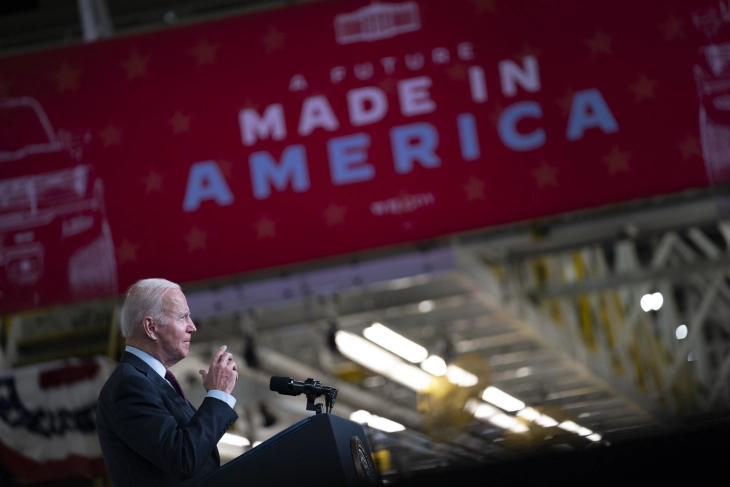Biden pardons turkeys at White House ahead of Thanksgiving holiday

Washington, 20 November 2021 (tca/dpa/MIA) — Americans will feast on smoked, fried, spatchcocked or just plain roasted turkey carcasses by the millions this Thanksgiving.
But they won't be feasting on Peanut Butter and Jelly – the two cutely named birds pardoned by President Joe Biden Friday afternoon in one the White House’s strangest traditions.
The turkeys spent Thursday night in style at the Willard Hotel and are now set to live out the rest of their short lives on the animal sciences campus of Indiana’s Purdue University.
The annual turkey pardoning ceremony is mostly a joke, spoofing the executive’s sweeping federal clemency power, granted by the Constitution.
For the turkeys, it means a quiet retirement. Corn and Cob, pardoned last year by then-President Donald Trump, were taken to Iowa State University and "are doing well," according to a school spokeswoman.
Before that, turkeys landed at Virginia Tech’s "Gobblers Rest" for several years, where Bread and Butter, spared from the dinner table in 2019, remain alive and clucking.
Peas and Carrots, pardoned in 2018, have since "died of natural causes that come with birds that age," said Zeke Barlow, a spokesman for the university’s College of Agriculture and Life Sciences. Turkeys bred for food have a lifespan of only a couple of years.
Changing up the destination gives each the "opportunity to host the turkeys and highlight the importance of agriculture education," the National Turkey Federation’s Beth Breeding said in an email.
Peanut Butter and Jelly break the recent streak of naming pardonees after side dishes found on the Thanksgiving table. They got their start in Indiana, raised by grower Andrea Welp.
Pardoning the turkeys is meant to strike a lighter note, though not everyone is laughing. The tradition has a convoluted history. Some see a link to Abraham Lincoln, whose son supposedly asked him to spare a turkey’s life. Later, Rhode Island’s "Poultry King" Horace Vose sent slaughtered turkeys as gifts to presidents like Ulysses S. Grant.
That’s not to say that presidents didn’t get gifts of live animals too. Calvin Coolidge received a raccoon in 1926 named Rebecca, but the first family decided not to turn her into a Thanksgiving feast. Instead, she spent her days in the White House as a pet, unscrewing jars and — her favorite, according to Grace Coolidge — playing in a half-filled bath with a bar of soap.
The modern tradition began to take shape in 1947, said Lina Mann, a historian at the White House Historical Association. In the food shortages that lingered after World War II, the federal government called for temperance and "poultryless Thursdays." That caused outrage, and crates of "hens for Harry" addressed to Harry Truman arrived in protest, she said.
The first full-blown turkey pardoning came under George H.W. Bush, and the annual event has looked largely the same in the three decades since then – even under the unconventional Trump presidency.
"I think that having the ability to just have a more lighthearted moment with the American people and with the press is something that a lot of presidents enjoy," Mann said.
Most presidents break out the puns or self-deprecating jokes, but Trump went further. "I expect this pardon will be a very popular one with the media," he said in 2019. "After all, turkeys are closely related to vultures."
As Biden becomes the latest chief executive to embrace the turkey pardon, the custom is still going strong, even if some scratch their heads at the idea of turning a powerful tool of the presidency into a farce.
"Just like he can pardon a turkey, he can use his clemency power in a way that would consider granting clemency to categories of people who may not have been treated justly," said Aamra Ahmad, senior policy counsel at the American Civil Liberties Union.
Ahmad pointed to a provision, included in one of the coronavirus relief laws passed by Congress and first implemented by the Trump administration, that released roughly 4,500 prisoners to home confinement during the pandemic emergency period.
Those prisoners would have to return and serve out the remainder of their sentences after that emergency period expires, the Trump administration said.
The emergency period was last renewed in mid-October. It is set to expire in January unless it’s renewed again.
"We think that this presents a great opportunity for president Biden to support their reentry by not sending them back," Ahmad said. "At this point it doesn’t serve any purpose to send people back to prison when they’re doing well in society."
During a Tuesday press gaggle, a reporter asked Deputy Press Secretary Andrew Bates about the optics of Biden pardoning turkeys before acting on a campaign promise to extend clemency and address inequality for people in the criminal justice system.
"I think the American people very clearly understand the distinction between what is a lighthearted tradition on the one hand and then an extremely serious and core priority for the president on the other," Bates said. "But we have announced some steps we are taking in the way of initial reviews, exploring his use of clemency powers, which was a campaign promise. And we look forward to sharing more about that in the future."







